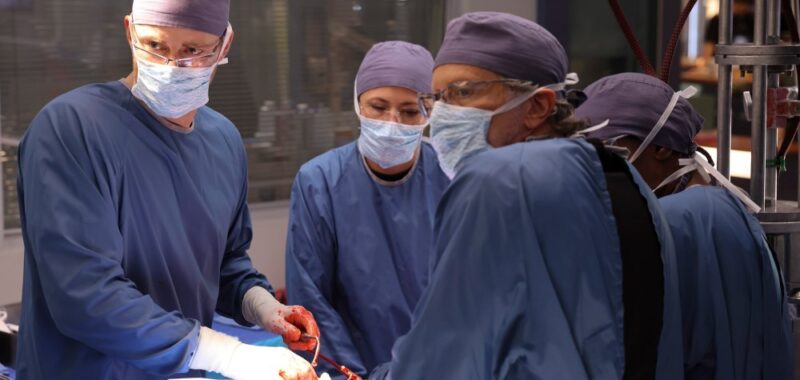
Luke Mitchell as Dr. Mitch Ripley, Steven Weber as Dr. Dean Archer in ‘Chicago Med.’ George Burns Jr/NBC
When watching characters perform surgery on your favorite TV medical dramas, you might wonder what shows use to create fake organs — and the answer is as gross as you feared it would be.
“It’s usually something synthetic that the art department fabricated. Early on, we used parts from maybe a pig of chicken to replicate [a human] organ,” Grey’s Anatomy star James Pickens. Jr., who has played Grey Sloan Memorial Hospital’s Chief of Surgery Dr. Richard Webber since the show’s 2005 premiere, exclusively shares in the latest issue of Us Weekly.
Pickens added that to be expected, there’s also plenty of fake blood on hand at all times to help surgical moments feel more authentic. “Gallons!” he tells Us, laughing. “We have enough fake blood to last us until the cows come home!”
But what about keeping actors safe during those intense moments in the operating room? Pickens says that most of the surgical instruments are real, but precautions are definitely taken. “The majority of them — the pickups, the forceps, the Bovie — are real,” he explained. But, obviously, with the scalpels, for safety reasons, they’ll use a dull blade.”
Typically, medical damas — Grey’s Anatomy, Chicago Med, New Amsterdam or The Resident, to name a few — are focused on telling the most unexpected and, yes, sometimes outlandish stories possible to keep the drama alive. That doesn’t, however, mean that they skip on doing their research.
When Dr. Arizona Robbins (Jessica Capshaw) returned to Grey’s Anatomy for season 20 last year, the show’s medical advisor, Michael Metzner, wanted her to come back swinging with a groundbreaking procedure that could showcase just how magical the OR can be.
In the episode “Baby, Can I Hold You,” Arizona performs the first-ever in utero vein on Galen surgery on a fetus, with the assistance of Dr. Jo Wilson (Camilla Luddington) and Dr. Amelia Shepherd (Caterina Scorsone). The vein of Galen is a blood vessel that can malfunction and cause heart and lung issues, according to the Boston Children’s Hospital. If a baby doesn’t receive surgery in time, the effects can be fatal.
The story was inspired by real-life doctor Darren Orbach, who helped develop the technique of operating on a fetus in utero. Metzner said the series brought Orbach “on as a consultant and interviewed him many times” to make sure they were getting every detail as accurate as possible.

Kim Raver and James Pickens Jr. in ‘Grey’s Anatomy.’ Disney/Anne Marie Fox
“It’s a very controversial thing. It’s still in its experimental stage, so there are a lot of fetal surgeons who advocate against doing something like this because of the history of it. But now, there are these cases in small numbers that have been successful,” Metzner told Shondaland.com in April, adding, “We also have a researcher who is not medically trained but is always scouring the headlines for new and cool things that are happening within medicine. So, it’s a team effort.”
Metzner recalled calling Dr. Orbach for the episode and requisitioning to “know every single needle and every single piece of equipment, to the detail that you used.” Metzner said production then “actually reached out to those companies” and purchased the “specific things” that the doctor would use.

James Pickens Jr. in ‘Grey’s Anatomy.’ Disney/Eric McCandless
“Then, I worked with our video-playback person to cut up the visual representations of the surgery to what would match to the scenes of the story we’re trying to tell,” he continued. “I worked with the actors and the director to have them mimic what’s going on in the surgery footage with their hands and with the actual equipment to marry the two.”
Metzner is the only physician who is in the writers room on a daily basis and working with the actors and directors. He is also involved in post production, which means he’s able to oversee the story lines from start to finish. Metzner added that occasionally — especially for procedures that are still in experimental stages — Grey’s will often use real imaging from patients in scenes to maintain authenticity.
“When a surgery has only been done a few times, that’s the only thing we can use,” he said. “We’ve done it in the past. Some of the images from our partial heart transplant last season were from [a real] OR.”
For more insights into the inner workings of the entertainment industry, pick up the latest issue of Us Weekly, on newsstands now.


